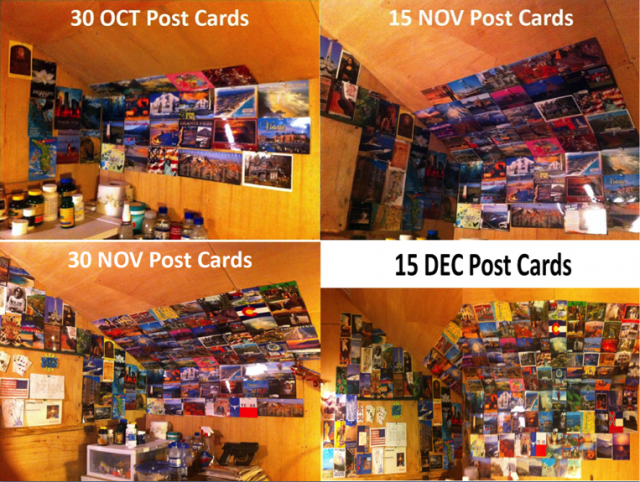‘Tis the season that many retailers look to tactics and strategies to programmatically maximize their e-commerce conversion, and customer value pre-peak. These new innovations are critical for success, but always include a bit of risk. Are there any “tried-and-true” approaches we can confidently implement pre-peak with 100% certainty?

We’re happy to advise you on how best to implement key tools such as those RichRelevance offers and believe that this—paired with “Hill Climbing” will benefit you most. Hill Climbing maximizes your profits by optimizing assets you already have. We encourage you to “Hill Climb” hard for the next few weeks to leverage your existing strengths, insights, and capabilities.
Model yourself after the most successful Hill Climbing organizations (Amazon, eBay, Google) and listen to data, test ideas rigorously, and optimize constantly. Two key tenets of Hill Climbing are Metrics and Meritocracy—make consistent measurement of change easy, and combine this with agile change management. Combining these two engenders a culture motivated by positive results and empowered to make them happen one step at a time.
Big Data has become the subject of Big Hype, much as Social Media and Mobile were recently. Our goal today is to peel back the hype and discover some of the key principles behind Big Data so we can make the best possible decisions about when, where, and how to apply it.
My background with Big Data has predominantly been in retail, as Principal Engineer in Personalization at Amazon, and now Chief Scientist at RichRelevance, so I will use several retail examples. However, the principles behind these examples are without question more broadly applicable. These principles are:
- Before we look at any data, we have to have a clear and well-defined goal. Otherwise we are likely to find very clever solutions to the wrong problems.
- Smart data science requires the same fundamental scientific method—hypothesis, experimentation, and analysis—as every other science.
- Correlation is not causation. We all know this, but in a big data world it is much easier to confuse the two.
- Data are economic assets. Understanding them as such helps us understand how to motivate all participants in the data economy, from individuals to corporations to governments and non-profits.
The Netflix Prize
The Netflix Prize has done more to bring Big Data and data science in general to the public mind than any other event. This has been great for increasing the visibility of the field, but I’m sad to say, miserable for actual practice. The saddest part is that the winning algorithms are not in use at Netflix today, and are unlikely ever to be.
Chief Data Scientist, Obama for America
(Click here to learn about our DataLove event in New York on October 8.)
Obama’s re-election campaign gave me first-hand experience in the potential of data to solve large-scale problems in the political arena, Of course we had a very real deadline and a very specific goal: get Obama elected on November 6. So when it came to analytics, we didn’t have the luxury of examining the data from every angle and find “insights” that we couldn’t eventually act on; we had to work within a very short window. What we learned—aside from how to survive without sleep for months on end—should benefit many organizations that want to use data to increase organizational decision-making, as well as consumer engagement and participation.
“Data mining,” the buzzword, is too limited for today’s data challenges. True, we mine data for the “gold,”—business and consumer insights—but it doesn’t stop there: insights are valuable only when you act on them, or “operationalize” them. We found it was vital to start with a simple data set (such as a user’s past political activities) and a clear objective (such as improving email click-through), and then deploy, test, refine, and repeat. We used machine-learning approaches (algorithms that detect data patterns to learn and improve their own functioning) to constantly evolve and improve our analytics.
 For those of you who live in a data cave on the West Coast like I do, it may come as a surprise that there was a blizzard this past weekend—a BIG one. The ‘Nemo’ blizzard, caused by a merging of two low pressure systems that originated in the central and southeast US, then migrated to the north-eastern seaboard—affected millions of people in the US Northeast, with heavy snow and multiple power-outages.
For those of you who live in a data cave on the West Coast like I do, it may come as a surprise that there was a blizzard this past weekend—a BIG one. The ‘Nemo’ blizzard, caused by a merging of two low pressure systems that originated in the central and southeast US, then migrated to the north-eastern seaboard—affected millions of people in the US Northeast, with heavy snow and multiple power-outages.
The crack about using Big Data to analyze Big Weather almost writes itself here, but it is rather astounding how much external events, such as extreme weather and power outages, can influence online activity. Obviously, it’s no surprise that without power, there’s no e-commerce – yet I am surprised with how closely we can track the storm’s influence (and people’s response to it) using RichRelevance’s dataset.
Three months ago, I deployed with the 101st Combat Aviation Brigade of the 101st Airborne Division (Air Assault) to Afghanistan as the Experimental Test Pilot for Task Force Destiny. After arriving in Bagram in mid-September to a “B-hut” with bare plywood walls, I realized I needed some wall decorations. So, in 21st century fashion I posted my address on my Facebook page and “hinted” that I might like to receive a letter or postcard from friends and family to pin up and add some color.

 I’ve now been a father for 26 days, so for the first time, I am on the other side of whatever recognition/acknowledgement rituals might ensue this Father’s Day. Despite centering my career around retail data, the nosey-child-poking-around-the-attic-before-Christmas in me quickly succumbed to the fact I can never predict any gift that my wife comes up with; she has proven time and again her ability to latch (no pun intended) onto that thing I said I wanted in passing last fall, realizing that I would never buy it for myself. No pressure, darling.
I’ve now been a father for 26 days, so for the first time, I am on the other side of whatever recognition/acknowledgement rituals might ensue this Father’s Day. Despite centering my career around retail data, the nosey-child-poking-around-the-attic-before-Christmas in me quickly succumbed to the fact I can never predict any gift that my wife comes up with; she has proven time and again her ability to latch (no pun intended) onto that thing I said I wanted in passing last fall, realizing that I would never buy it for myself. No pressure, darling.
So, starting smaller (or larger, depending on your perspective), we recently conducted a study at RichRelevance to observe Father’s Day retail trends, with the hypothesis that there would be differences in shopper behavior in the United States vs. in the United Kingdom, both celebrating the holiday on the same day. Incidentally, there are many retail trends this time of year in addition to Father’s Day, such as gardening, fishing, camping, and graduation; the latter most often gets coupled with Father’s Day, if for no other reason than habitual reliance on the tiredly rhyming promotion “Dads and Grads.”



